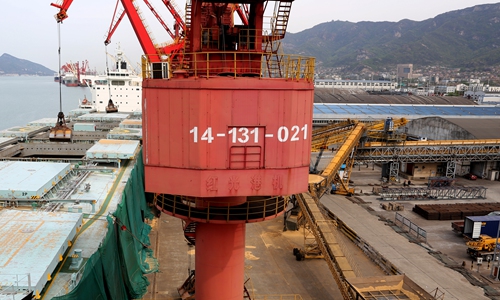SOURCE / INDUSTRIES
Refusing virus guarantees may slash Brazilian soybean exports to China: analyst

A ship unloads soybeans from Brazil at a terminal in Lianyungang port, East China's Jiangsu Province. The 80,000 tons of soybeans left Brazil in March, and they will mainly be used to make edible oil and soybean meal feed. Photo: cnsphoto
A call by a Brazilian grain association to not give China the coronavirus-free guarantees it sought may delay or even greatly reduce bilateral soybean trade, which is currently at the peak as it's harvest season in the South American country, industry experts said.
Reuters reported that ANEC, an association representing local grain traders, said Brazilian grain exporters should not give China the guarantees it requested that their cargoes are free of the novel coronavirus, as that would require extensive testing.
"ANEC is preparing a letter for associates to respond in an equal manner. Preferably, we would like the declaration ... not to be signed [by the exporters here]," Marcos Amorim, director of ANEC's contract committee, said, referring to a Chinese document in which exporters would say their shipments are COVID-19 free, according to Reuters.
"As for exporters declaring they comply with Chinese laws, ANEC recommends against doing so," Reuters reported.
"It has to be stressed that tighter rules on imported food are 'forced' steps China is taking to curb a resurgence of COVID-19 in Beijing, which was mainly linked to a Beijing wholesale market," Jiao Shanwei, editor-in-chief of cngrain.com, a website specializing in grain news, told the Global Times on Sunday.
China is stepping up inspections of fresh and frozen meat and seafood after the new outbreak, both domestic and imported products, after the new outbreak.
The rule also aims to emphasize the import traceability of all quarantine inspection products, which could encourage the public to have confidence in consumption of imported foods, a manager with a major seafood import company told the Global Times.
Jiao said considering the large amount of soybeans China imports from Brazil, the impact could be "big" on both sides.
China is the world's top soybean buyer and is expected to import about 94 million tons in the 2019/20 crop year, mostly from Brazil and the US, Reuters said.
From January to March, Brazil's soybean exports reached 49 million tons, up 40 percent year-on-year. Of the total, exports to China increased to 74 percent.
Exporters who rely on and benefit from the Chinese market should also understand China's position on this and obey Chinese law instead of purely resisting it, which will only disrupt its trade ties with China, experts urged.
A major Chinese seafood importer told the Global Times previously that all of its suppliers are cooperative and willing to give the guarantee as they "want to do business with China."
Global Times

